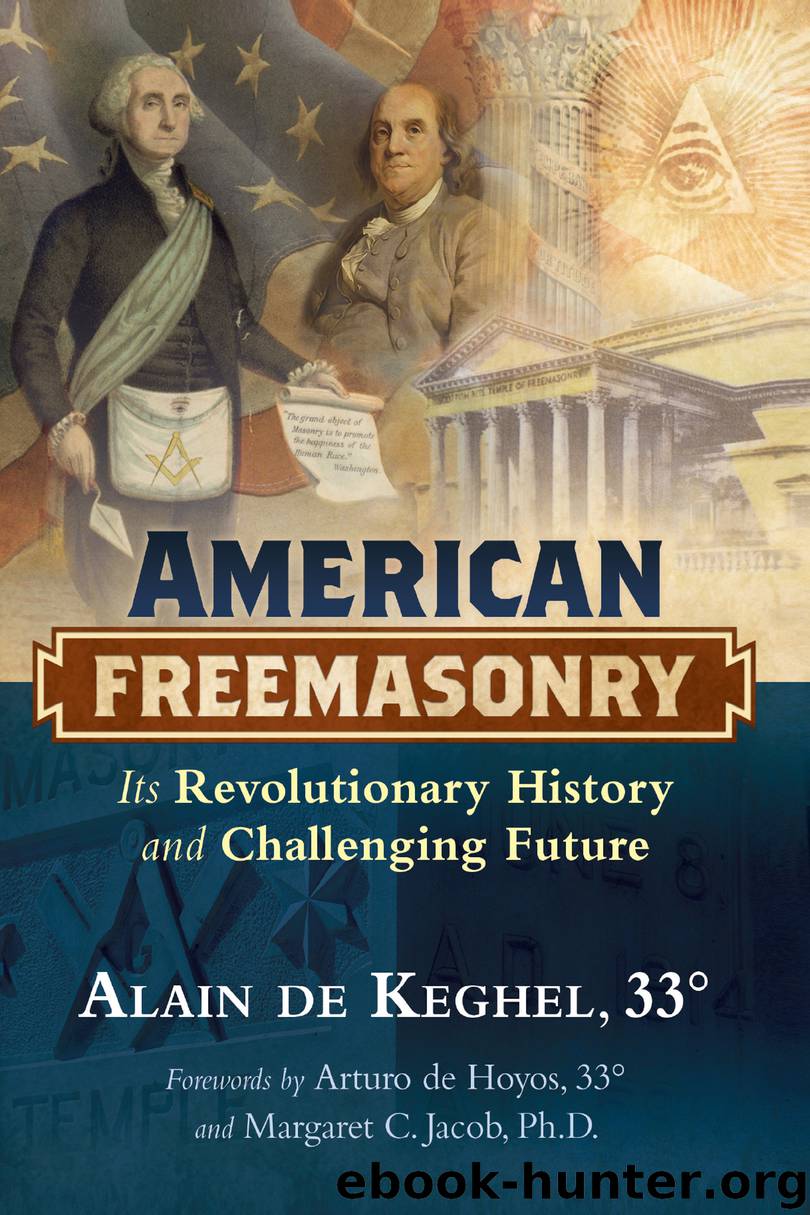American Freemasonry by Alain de Keghel

Author:Alain de Keghel
Language: eng
Format: epub
Tags: Secret Societies
Publisher: Inner Traditions/Bear & Company
Published: 2017-07-31T04:00:00+00:00
8
Relations and Ruptures with French Freemasonry
On the Close and Often Tumultuous Franco-American Relations
The relations of French brothers with their American counterparts are easily fed on representations that do not withstand the rigorous analysis of historians. These relations are also, more often than some may suppose, the result of stakes that do not solely involve the GODF. I have discussed them earlier but will do so again with respect to the French lodges of North America. The frequent interpretations of the “ruptures” between the GODF and the American grand lodges have palpably varied and have not necessarily taken into account one primary truth: even if the system of regularity, or more specifically the rules of recognition that flow out of it, is not monolithic and authorizes a certain flexibility to these grand lodges in their relationships, it is fundamentally the rules laid down by the United Grand Lodge of England that always governs the jurisprudence of the Commission on Information for Recognition of the Grand Lodges of the United States.
Those who witnessed the great disappointment of the Grand Lodge of France in 2003, when they thought the game was won, can testify to the absolute primacy of the rules laid down by London in 1929, which have since been modified several times, the last of which was in 1989. They are invariably applied, more or less, in the United States. And it is not the relative relaxing of these rules granted by the pro–grand master of the United Grand Lodge of England that will change much of anything in this regard. What matters first and foremost is the recognition by London, even if each American grand lodge retains a certain latitude in the application of its rules. We have seen how the sequences of the relationship between the GODF and the United Grand Lodge of England played out.
Based on a question of symbolic lodges—and as we have seen thanks to Pierre Mollier’s findings—it was the failure in 1776 of a negotiation entered into in 1774 on a formal agreement of reciprocal recognition between the GODF and the United Grand Lodge of England that led the latter to send a circular telling the Grand Lodges of Ireland and Scotland to burn their bridges with GODF. It is fairly obvious that the political context of that time, mainly the aid provided by France to the American revolutionaries who had just proclaimed their independence, was not actually propitious to the establishment of a cordial understanding between obediences. The Grand Orient’s refusal to recognize the primacy of the United Grand Lodge of London, a prerequisite before the official relations that had never existed could be established, did the rest. But this was of little consequence in an America then fighting for its emancipation from London.
To the contrary, in 1828, an alliance of friendship was solemnly concluded between the two Supreme Councils of the Southern and Northern Jurisdiction of the United States on the one hand and the Grand College of the Grand Orient of France on the other.
Download
This site does not store any files on its server. We only index and link to content provided by other sites. Please contact the content providers to delete copyright contents if any and email us, we'll remove relevant links or contents immediately.
Animal Frequency by Melissa Alvarez(4457)
Sigil Witchery by Laura Tempest Zakroff(4232)
Real Magic by Dean Radin PhD(4118)
Fingerprints of the Gods by Graham Hancock(3983)
Aleister Crowley: The Biography by Tobias Churton(3626)
Journeys Out of the Body by Robert Monroe(3608)
Alchemy and Alchemists by C. J. S. Thompson(3506)
The Rosicrucians by Christopher McIntosh(3505)
Mysteries by Colin Wilson(3444)
Hitler's Monsters by Eric Kurlander(3324)
The Hatha Yoga Pradipika (Translated) by Svatmarama(3312)
Wicca: a guide for the solitary practitioner by Scott Cunningham(3162)
John Dee and the Empire of Angels by Jason Louv(3157)
Infinite Energy Technologies by Finley Eversole(2968)
Book of Life by Deborah Harkness(2919)
Dark Star Rising by Gary Lachman(2860)
The Book of Lies by Aleister Crowley(2828)
Aliens by Jim Al-Khalili(2822)
To Light a Sacred Flame by Silver RavenWolf(2808)
